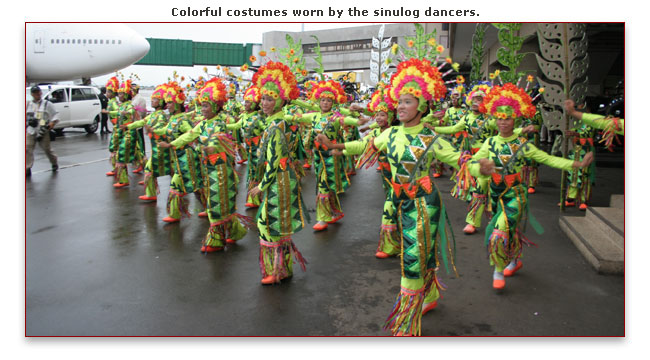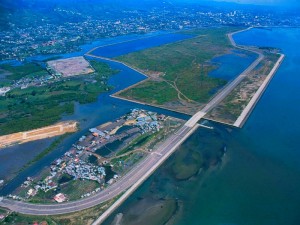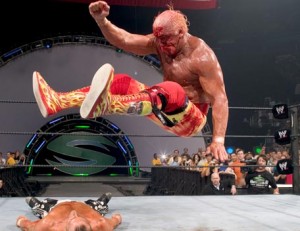We’re not even talking about the city’s fine females whom we saw, encountered, gawked at, stared at, thought about, talked to, fantasized, toasted to, drank with, flirted with, hit on, gossiped about, Googled, confronted, took pictures of, tailed.

For your reference
Everything except scored with, given the nature of our limited budget, lack of sophistication, and overall charm deficit.
In any case, Cebuanas are works of art, national treasures, true symbols of Filipino beauty.
And yes, that includes you, Governor Gwen Garcia, despite your bad hair days.
Cebuanas deserve a separate blog entry, an ode, here at Indolent Indio.
But we’re getting carried away.
And so, to begin:
Bigger is not necessarily better.
Best proof of that is Metro Manila.
Besides being the Philippines’ richest and most populous city, the metropolis also enables its residents to enjoy a 24/7 lifestyle every single day of the year.
As a result, every Manileño — including the pseudo-city slickers in Tondo and the coño kids in Makati — exude a sense of superiority wherever they go.
But those days are about to end, if they haven’t yet.
How come?
Metro Cebu is about to overtake Manila in more ways than one.
With its low-key nightlife and well-planned urban development, Cebu has increasingly trumped the offerings of Metro Manila.
Facilities in the Queen City of the South are not only world-class but are more advanced than those in Manila.
It has everything that the capital can offer without the severe urban blight that is Manila.
Take our first example.
Tarmac
For years, the Mactan International Airport reigned supreme.
Before terminals two and three of Manila’s Ninoy Aquino International Airport (NAIA) were built, everyone — Manileños included — were aghast at the monumental confusion spawned by its layout.
Departing or arriving at the NAIA was like being stuck in a government housing project whose contractor absconded with the money the minute the check cleared.
You needed a guide to navigate the maze that would bring you to the boarding gate and once there, you needed someone to take a pee break before you could even get a seat.
Just a decade later, NAIA’s Terminal II — built (or so it seemed) for the exclusive use of Philippine Airlines, now controlled by Lucio Tan — is showing its progenitor’s shortfalls.
Even on regular days, passengers are reduced to munching on exorbitantly-priced yet tasteless sandwiches while standing up.
No such thing at the Mactan airport, then and now.
Seats at the departure lounge are always available, even if the terminal serves passengers of as much as seven flights — domestic and international — on a given hour.

Also, pre-flight entertainment
Moreover, if your flight gets cancelled, all you have to do is to park your posterior at the nearest strategic location and drink in the sights of young, nubile, and shapely Cebuano-speaking eye candy.
This piece of advice is especially useful if you’re male or lesbian.
But let’s not get into that.
Taxis
Taxis are plenty to and from the Mactan airport, within the metro, and any which way to and from the city. And even though drivers only speak a sprinkling of Tagalog, most of them won’t screw you over.
Best proof — again — is reason Numero Uno: the airport.
Upon reaching the arrival area, passengers can choose to board yellow cabs that are readily available on the same floor but at higher prices.
The well-worn and otherwise budget-conscious traveller is advised to take the elevator to the second floor — the departure area — and exit the building from there.
Why?
Just outside the departure area’s entrance and exit gates is a queue of regular-priced cabs, waiting for their next fare.
To ensure against any irregularities, security personnel are posted at the head of the line, handing out small pieces of paper containing the cab’s license plate number, useful for reporting incidents should anything go wrong.
No such arrangements are available at the departure area of Manila’s Terminal II.
Cabs are encouraged to leave without any passengers at all once their fares have gotten off.
So what happens?
The driver will only take you in if you agree to pay an extra amount on top of the regular fare and/or if you promise to let him cop a feel.
This insight is especially useful if you’re female, gay, or lesbian.
But let’s not get into that.
Talk Radio
If Manila’s airwaves have Papa Jack, Metro Cebu has Papa Joe.
Papa Jack’s good in dispensing advice to his callers regarding matters of the heart and — arguably — cracking jokes.
But Papa Joe’s better.
Besides being the audio version of an advice column, Papa Joe also helps out with the sundry problems of Cebuanos — dead, malfunctioning cellphones,
faulty motorcycle engines, and — get this — high blood and aneurysm.
He even knows if his callers just want airtime because he lets out a barrage of questions before answering them.
Moreover, unlike Ernie Baron, he doesn’t claim to know everything.
If Papa Joe doesn’t know the answer to a question, he asks listeners to call back without telling them that they should buy triangle-shaped hats or drink water from boiled leaves.
Also unlike Ernie Baron, Papa Joe can rap.
Traffic
The Cebu City government has always advertised its South Road Properties (SRP) Project on at least one local cable television channel.
The advertisement features Caucasian-looking executives, extolling the virtues of doing business in Cebu and why investors should put their money in the city, particularly the SRP.
A reclaimed area, the project will soon be the site of another SM Mall of Asia by 2013, among other developments.
To ensure the smooth flow of vehicular traffic between the SRP and the city, project’s proponents have already built a highway for the very purpose.

All Malls of Asia must be built on reclaimed land
In turn, the newly-constructed highway — which is to Cebu what the C-5 is to Manila — has also produced a fringe benefit.
It is now used by motorists as the main thoroughfare to the South, helping decongest traffic along the city’s old South Highway.
As far as we know, that didn’t take a genius to figure out.
Tourists
Given the past four reasons, is it any wonder why Cebu continues to attract more tourists than Manila?
Nope.
What does this prove?
Build good infrastructure in a city that already has a great culture and a laid-back atmosphere — tons of babes wouldn’t hurt — and you get a tourist magnet.
Not only do residents reap from the tourism industry’s multiplier effects, you also bring forth a vibrant city that is both fun to live and work in.
Fact is, there may be more tourists per square foot in Metro Cebu than any other city in Metro Manila, thanks to direct flights mounted between foreign destinations and Cebu.
Indeed, everything’s good — and cool — in Cebu.
Now, if we can only score with the babes.
But let’s not get into that.
—
Thank you, Indolent contributor D.R. Alvarado!






